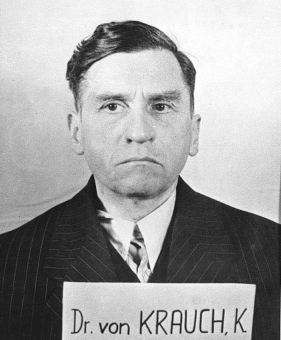Carl Krauch (1887–1968)

© National Archives, Washington, DC
“As a matter of fact, the I.G. Farben could not be forced to construct a Buna factory. The Reich Ministry of Economics approached them with the proposal in this matter. The Executive Board (Vorstand) of I.G. Farben—consisting of the gentlemen Schmitz, as Chairman, Ilgner, von Schnitzler, von Knieriem, Christian Schneider, ter Meer, Ambros, Bütefisch, etc.—could agree on, or refuse, the erection.”[1]
Carl Krauch was born in Darmstadt on April 7, 1887, the son of Carl Krauch, a chemist and pharmacist, and his wife, Martha (née Schwaderer). After high school, he studied chemistry and botany in Giessen and Heidelberg, starting in 1906, and obtained his doctorate in 1911. In 1912, after a year as an assistant at the University of Heidelberg, Carl Krauch took a job with the Badische Anilin- und Sodafabrik (BASF). He was drafted for military service in 1914, but was recalled by his employer only one year later because BASF viewed him as indispensable. He worked at the BASF plants in Oppau and Leuna. In the former, he was first made responsible for rebuilding after the explosion in 1921, and then he served as assistant plant manager. He had been made an authorized signatory in 1919, and in 1926 he was named an alternate member of I.G. Farben’s managing board, with full membership bestowed in 1934. Carl Krauch was married to Marie Elisabeth Lüders, and the couple had five children. His son Carl Heinrich also became a chemist at BASF.
In 1929, Carl Krauch was made chief of the newly created Product Division I (nitrogen, gasoline, diesel fuel, lubricating oils, mines). In this capacity, he acted on behalf of Carl Bosch in negotiations with Standard Oil, which resulted in the founding of the Joint American Study Company (Jasco) in 1930. As of 1935, as chief of the Wehrmacht Liaison Office (Vermittlungsstelle W[ehrmacht]), he guided cooperation between the firm and the Reich authorities, and one year later Göring appointed him head of the Research and Development Department in the Office of German Raw Materials (Amt für Deutsche Roh- und Werkstoffe). In addition to this work, Krauch retained all his I.G. positions. In 1937, Carl Krauch joined the NSDAP and became a member of the supervisory board of the Kaiser-Wilhelm-Gesellschaft (KWG, Kaiser Wilhelm Society). In 1938, he was named a “military economy leader” (Wehrwirtschaftsführer) and General Plenipotentiary for Special Questions of Chemical Production (GBChem, Generalbevollmächtigter für Sonderfragen der chemischen Erzeugung) under the Four Year Plan. Thus Krauch became a “key figure in the interweaving of the National Socialist state and I.G. Farben”[2] and carved out a career in industry and politics concurrently: In May 1940, he succeeded Carl Bosch as chairman of the supervisory board of I.G. Farben, and two years later he was made acting head of the Reich Office for Economic Expansion (Reichsamt für Wirtschaftsausbau). Krauch was active primarily in the military build-up, and he strongly advocated concentration on chemical agents
In recognition of “victories on the battlefield of German industry,” Adolf Hitler awarded Carl Krauch the Iron Cross in 1939. In his capacity as the “GBChem,” he made use of his political connections to get Heinrich Himmler to agree in February 1941 to provide all possible assistance in the building of the I.G.’s new Buna plant in Auschwitz. Krauch was awarded an honorary doctorate by the University of Heidelberg and an honorary professorship by the University of Berlin.
After the war ended, the U.S. occupation authority placed Krauch under house arrest, and in his trial in Nuremberg in United States v. Carl Krauch et al., he was sentenced on July 30, 1948, to six years in prison for “enslavement,” the inhuman use of concentration camp prisoners at the I.G. Auschwitz construction site.
After that, he became a member of the supervisory board of the Bunawerke Hüls GmbH. In the first Frankfurt Auschwitz Trial, in his examination as a witness on February 19, 1965, he denied all knowledge of the events in Monowitz. Carl Krauch died on February 3, 1968.
(SP; transl. KL)
















